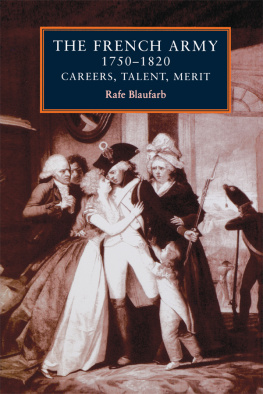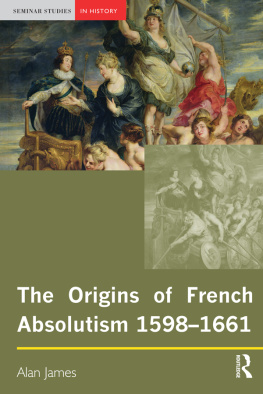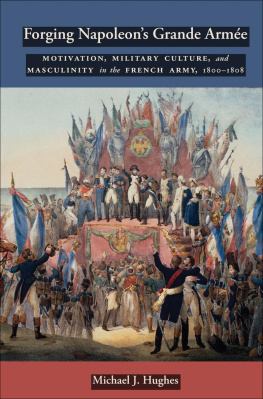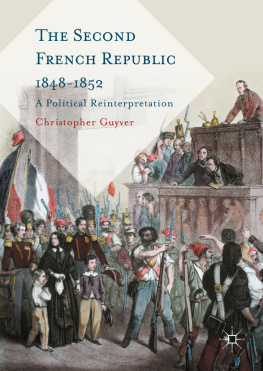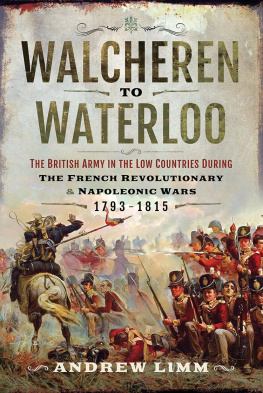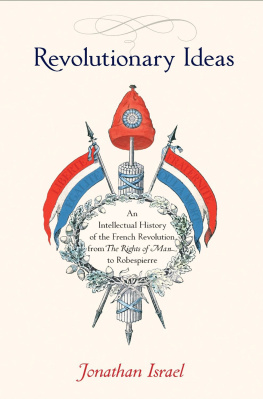Copyright Rafe Blaufarb 2002
The right of Rafe Blaufarb to be identified as the author of this work has been asserted by her in accordance with the Copyright, Designs and Patents Act 1988.
Published by Manchester University Press
Altrincham Street, Manchester Ml 7JA, UK
www.manchesteruniversitypress.co.uk
British Library Cataloguing-in-Publication Data is available
ISBN 978 1 7849 9391 7 paperback
First published by Manchester University Press in hardback 2002
The publisher has no responsibility for the persistence or accuracy of URLs for any external or third- party internet websites referred to in this book, and does not guarantee that any content on such websites is, or will remain, accurate or appropriate.
Contents
List of tables
Acknowledgements
Glossary
Introduction
The merits of birth: lineage and professionalism in the Old Regime
The meanings of merit in 1789
The death and rebirth of the officer corps, 179093
Republican meritocracy in the nexus of war, civil strife, and factionalism
The politics of professionalism during Thermidor and the Directory, 179499
Napoleons improbable synthesis: monarchy and meritocracy in the reconstruction of the officer corps, 17991815
Conclusion
Bibliography
Index
1.1 Reductions planned by Guibert, autumn 1787
1.2 Reductions actually approved by the War Council
6.1 Sources of recruitment of directly commissioned officers, year VIII1812
Without the assistance of the University of Michigan, French Ministry of Culture, Andrew W. Mellon Foundation, American Society for Eighteenth Century Studies, Stephen F. Austin State University, Auburn University, and Camargo Foundation, this book could not have been written. I would like to acknowledge their generous aid and thank them for it. I would also like to express my appreciation to the archives and libraries in France that facilitated my research: the Archives de la guerre, Archives nationales, Bibliothque nationale, Archives dpartementales des Bouches-du-Rhone, Archives dpartementales du Cher, Archives dpartementales du Bas-Rhin, Archives municipales de Strasbourg, and Bibliothque de lUniversit de Strasbourg. Without the guidance and frequent augmentations de quota they granted to me, it would have been impossible to conduct research on the scale necessitated by the chronological span and institutional scope of my subject.
This project has taken nearly ten years to come to fruition. Along the way, many people have offered advice, encouragement, and ideas. I would like to express my gratitude to them all. In particular, I have always enjoyed the unfailing support of mentors who have cheerfully invested daunting amounts of their precious time and energy in my work-in-progress. The debt I owe to David Bien should be evident throughout the pages of this book. A continuation of his own work on the Old Regime French officer corps across the great divide of 1789, it is intended as a tribute to his incisive and inspirational scholarship. He has seen me through my first steps in the profession of history, showing me the way by his own example and giving unstintingly of himself even after his retirement from teaching. His detectives instinct, editorial rigor, and personal generosity make him a true model of mulation.
Many others have contributed to this project. At the University of Michigan, John Shy, Raymond Grew, and Marie-Hlne Huet read the final draft of my dissertation and commented extensively on it. Those comments, preserved on tape, have guided me through many long nights of revision. At Michigan, I also had the good fortune to count Samuel Scott as a neighbor. It was during a long summer afternoon in his back yard that Sam shared with me his unparalleled knowledge of the Archives de la guerre. His faith in my ability to carry out such a large research agenda has never flagged.
During my two years of research in France, many individuals welcomed me and supported my endeavor. Jacques Revel sponsored my application for a Bourse Chteaubriand and gave me an institutional home at the Ecole des hautes tudes. The seminars of the Ecole provided an incredible degree of intellectual stimulation and introduced me to scholars who contributed in various ways to my thinking. They include Simona Cerutti, Robert Descimon, Patrice Gueniffey, Alain Guery, and Edna Lemay. The French university system was equally hospitable. At Paris I, Jean-Paul Bertaud was always ready to share his profound knowledge of the revolutionary armies. At Paris IV, Jean Chagniot and Andr Corvisier welcomed me to their military history seminar, where the spirit of the old French officer corps still soldiered on. And the workshop on revolutionary elections guided by Serge Aberdam and Bernard Gainot still remains a stopping-point on my trips to Paris.
Many people played midwife as my dissertation gave birth to a book. Among those who read all or part of it were Gail Bossenga, Howard Brown, Alan Forrest, Al Hamscher, Nira Kaplan, Meyer Kestnbaum, Michael Kwass, Sarah Maza, Judith Miller, John Lynn, Guy Rowlands, Sam Scott, Jay Smith, Cecile Vidal, and Isser Woloch. And it goes without saying that thanks are due to the editorial staff at the University of Manchester Press for their care in producing the present book.
This book is dedicated to my mother, father, and sister, whose unflagging, unconditional love provided a foundation from which I could venture into a world which is no more. They have given up much, especially physical proximity and all that entails, so that I could pursue my professional calling. I hope that my book lives up to the sacrifices they have made for it.
Note on translation
All translations are the work of the author unless otherwise indicated.
acadmie: school designed to teach chivalric behavior to young nobles.
amalgame: successive republican efforts to consolidate military formations into new units known as demi-brigades.
anobli: someone who had recently entered the nobility by purchasing an ennobling office.
cadet-gentilhomme: entry-level position designed to provide a hands-on apprenticeship at soldiering for noble officers.
cahiers de dolances: grievance lists drafted in early 1789 in anticipation of the Estates-General.
Carabiniers: one of the more prestigious cavalry regiments in the royal army.
carmagnole: a popular dance, associated with the sans-culottes, that was fashionable during the Terror.
chasseurs: a type of light infantry.
collge: the standard Old Regime institution of secondary education, usually church-run.
commissaires: deputies of the Assembly invested with substantial powers and charged with carrying out urgent missions of national security.
commissaires des guerres: military administrators who, during the Old Regime, purchased their offices and often passed them down to their sons.
concordat: an unofficial regimental retirement fund formed from contributions levied on the younger officers.

